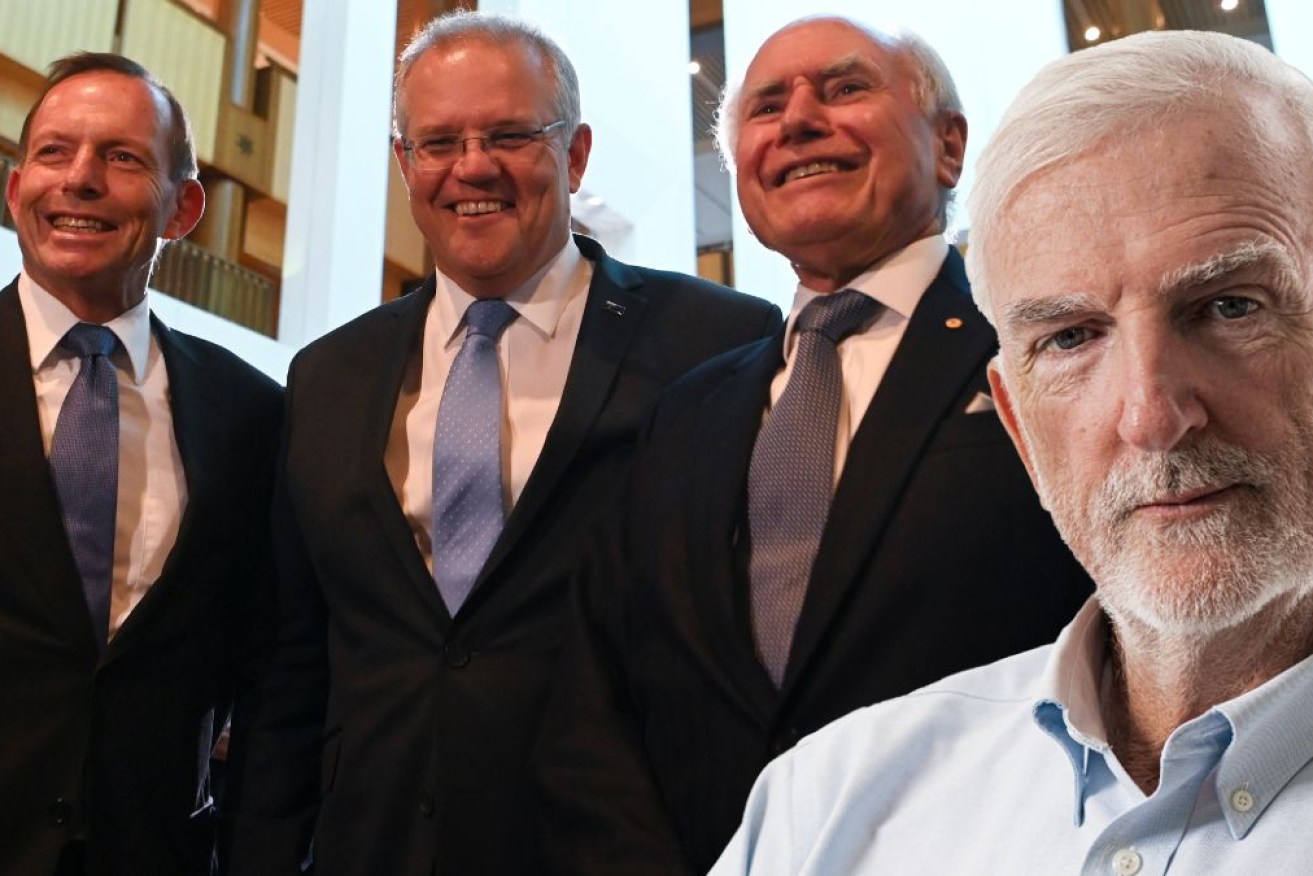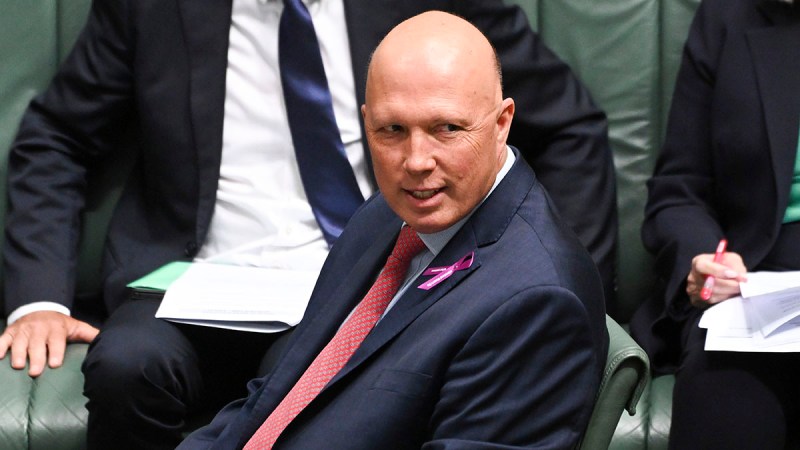
Tony Abbott, Scott Morrison and John Howard all hurt Australia, writes Michael Pascoe. Photo: TND/AAP
On Wednesday a desperate headline was made out of an irrelevant Scott Morrison “warning” Anthony Albanese about the Prime Minister’s China visit.
There’s a dog across the road, barks a bit. Her woof-woofs would be of greater value.
The dog has never been a wrecking ball trashing Australian diplomacy, doesn’t have a track record of lying or duplicitous governance, suffers from no strange ideology potentially distorting her judgement and is not a Donald Trump fan.
In my book, that makes her more worth listening to than Mr Morrison.
It must have been a very quiet day in London for Mr Morrison to be noticed on the sidelines of the grandiosely-titled Alliance for Responsible Citizenship conference – a three-day right-wing gathering providing a culture wars echo chamber for conservative spear-carriers and failed Liberal leaders, with Messrs Howard, Abbott and Morrison among the 100 or so Australians attending at somebody else’s expense.
Each of the three failed PMs has managed to generate a headline while on tour, Howard dissing multiculturalism, Abbott dismissing the “climate cult”, and Morrison sledging Mr Albanese’s China visit.
I’ll come back to the last of those, but first the confluence of the Liberal trio poses a perennial question that probably won’t be asked in London: Who has been the worst leader of the federal Liberal Party?
It’s a tough one.
The conservative faithful would no doubt nominate any and all of the parliamentary leaders who failed to win government, so the question needs refining: Which leader of the federal Liberal Party has done the most damage to Australia?
The race is open-ended, given Peter Dutton is doing his utmost to be divisive, misleading, negative and to keep the culture wars firing. He displays an inclination to combine the worst traits of Howard and Abbott, but he is yet to have the opportunity of being prime minister to test the full potential of his hostility.
In chronological order then, the main charge that tends to be made against the Howard prime ministership is that it set the tone for what came after – the weakening of the public service, the elevation of the culture wars, the demise of ministerial responsibility and the dismissal of the “black arm band” view of our history just when Australia was opening up to owning its past.
Good government, then not so much
The first two terms of the Howard Government featured good governance. There was genuine ministerial responsibility – ministers were sacked for failures. Major difficult tax reform – the GST – was taken to an election for a mandate. And, most famously, there was gun control.
Whether or not you liked the policies, they were legitimately introduced and Australia was better for them.

Opposition Leader Peter Dutton.
Then good government went to hell in the third and fourth terms, starting with the “children overboard” lie and going downhill from there. The Tampa affair, demonising refugees, joining disastrous American military adventures, ditching the concept of ministerial responsibility, running dead on climate, turning superannuation into an egregiously iniquitous and extravagant tax haven for the wealthy and the great sin of omission – not investing the resources boom windfall.
But then came Tony Abbott, the great wrecker.
His signature “achievement” was destroying anything like effective carbon policy in keeping with his unrepentant and continuing climate denialism, locking Australia into a lost decade aligned with Saudi Arabia and Russia.
Repealing the resources rent tax was a close second, popular with party donors but denying the Commonwealth a reasonable and valuable revenue stream. On a much smaller scale but symptomatic and with the same mentality and popularity with party donors was ditching Labor’s fringe benefits reform to tighten the car novated lease tax rort.
Successful as an Opposition Leader – success being winning government – he seemed to remain in that role despite becoming prime minister, continuing to kick any head he saw.
Politicisation of the public service was pushed to another level. Among his very first decisions were the “night of the short knives” sacking quality public servants and pulling Steve Bracks off the plane to New York so he could send his great supporter and fellow climate vandal Nick Minchin as consul-general instead.
Abbott’s head-loppers
Whether or not they had any connection to the Labor Party, anyone appointed by the previous government was a candidate for non-renewal.
John Howard had achievements. Tony Abbott had unrelenting pugilistic snark blessed by George Pell’s conservative theology.
By comparison, Scott Morrison was mainly just weird, influenced by his even stranger and crueller prosperity theology. The lies, the duplicity and secrecy, the further climate scepticism and defenestration of the public service were topped by the sheer nuttiness of his clandestine multi-ministries and his pushing of corrupt pork barrelling to previously unimagined multi-billion-dollar levels.
I’d argue the most damage he did though was his disastrous mangling of our diplomatic ties and setting Australia’s course to be even more of America’s Deputy Dawg through the AUKUS nuclear-powered submarine stunt – a course Defence Minister and Deputy PM Richard Marles continues to sail.
Stacking key security and defence posts with a range of Sinophobes, dingo warriors and American admirals and spooks while sidelining diplomacy is proving to be his lasting legacy.
The epitome of Mr Morrison’s ineptitude, fresh from basking in the warm inner glow of a conversation with Donald Trump, was needlessly managing to push the steadily escalating tension with our most important economic partner over the edge in the way he bellowed a demand for a weapons-inspector-style investigation of the origins of COVID.
As with everything else that went wrong on his watch, from Robodebt to grants corruption, Mr Morrison is unrepentant, still seeking some sort of relevance in conservative circles, a master of the cascading Bart Simpson defence: I wasn’t there; I didn’t do it; you didn’t see me; you can’t prove a thing.
In the footsteps of Gough
Mr Albanese’s China trip, 50 years after Gough Whitlam’s historic visit and recognition of China, is another delicate and cautious step towards a healthier relationship, despite the surrendering of Australian sovereignty to the US.
It was a clear message received by we members of the Asia Pacific Journalism Centre visit to China last month.
As Karen Middleton reported in The Saturday Paper, China hopes for an independent Australia, rather than one in lockstep with its great rival.
That does not appear to be on Australia’s political horizon, but civilised diplomatic behaviour, “agreeing where we can, differing when we must”, is a massive improvement on Morrison’s tone-deaf blundering making difficult situations worse.
Australia has been capable of independent policy in the past. When China was starving thanks to Mao’s disastrous Great Leap Forward, the Menzies government was prepared to provide wheat against US policy at the time of not trading with China.
Humanity and longer-sighted diplomacy trumped the domestic political perceptions and America’s wishes.
So Morrison’s greatest damage to Australia’s best interests may be repairable more quickly than Abbott’s. (And, as I keep trying to remind people, it was “smash’em” Peter Dutton who actually led the domestic political COVID charge against China.)
Thus, for mine in this quick once-over-lightly summary, Tony Abbott wins as the worst Liberal Party leader.
It’s not a definitive judgement. Historians will eventually deliver hefty tomes on the subject. And given the trajectory of the LNP, there’s always another contender.
No comments:
Post a Comment